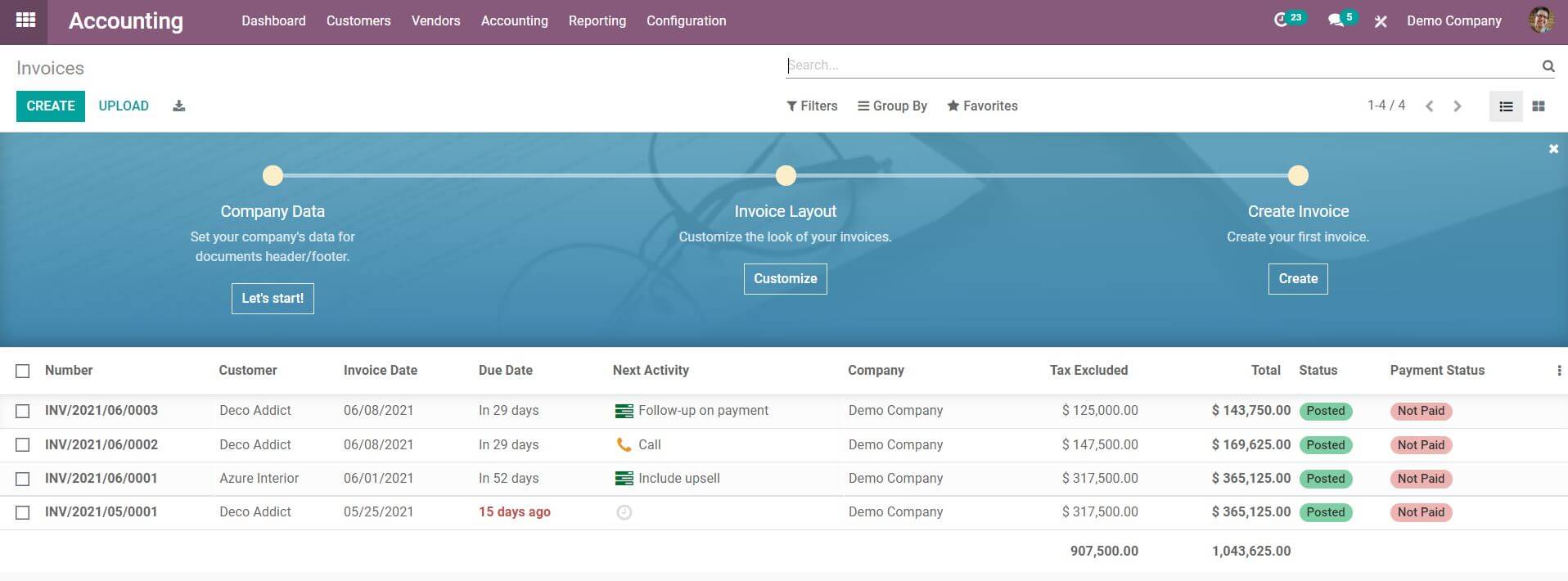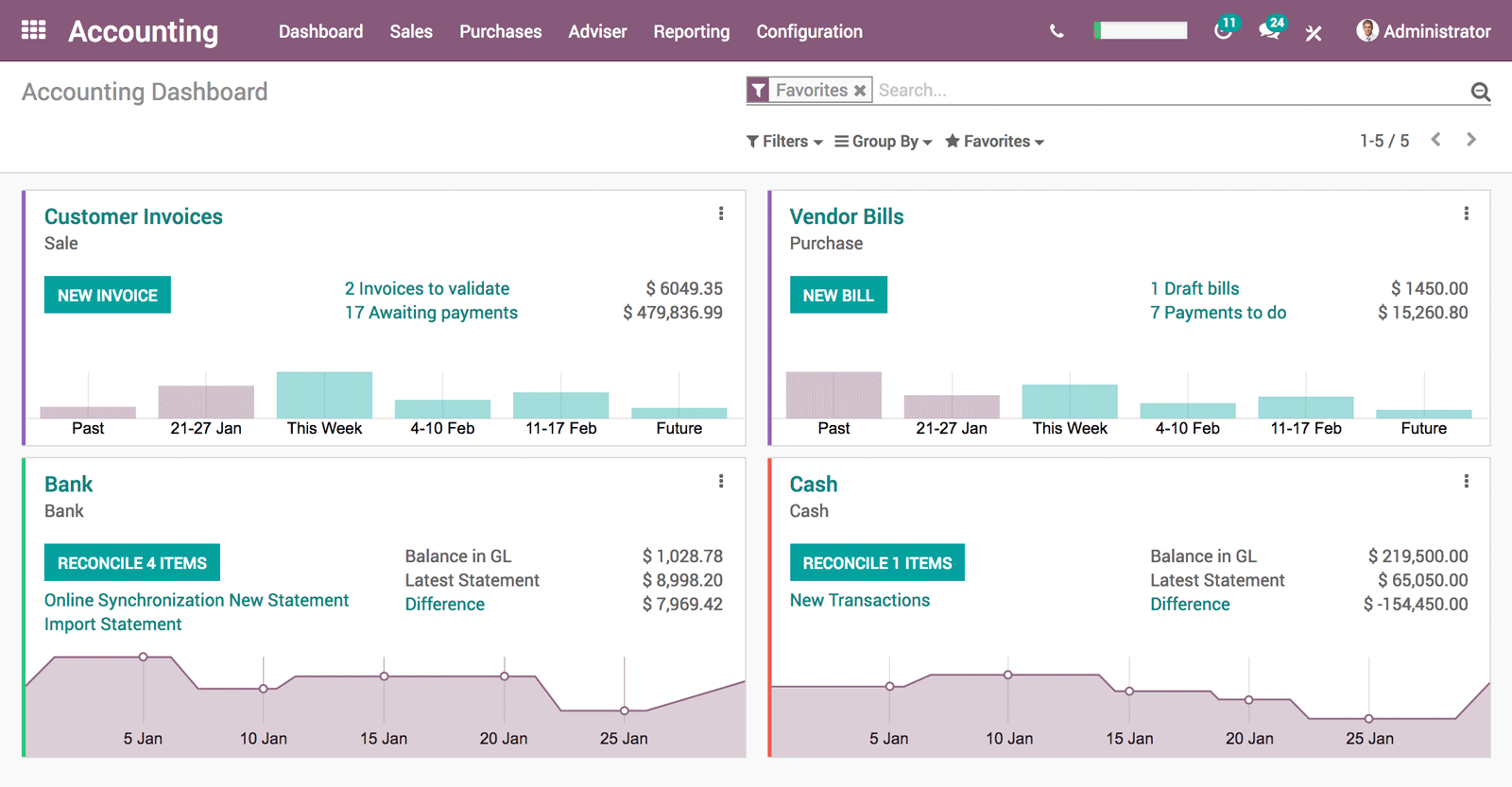When you want to unleash your business growth potential, Odoo is a perfect match for cloud bookkeeping and billing. However, can its accounting app cover all your needs? Let’s find out in this Odoo Accounting review.
What is Odoo Accounting?
Odoo Accounting is an innovative invoicing and billing solution designed mostly for SMEs searching for flexibility. It is not an ordinary bookkeeping software but a reliable enterprise resource planning solution. Most importantly, Odoo Accounting has two versions: open-source and cloud-based. So, it means you can customize it whenever you like to fit the requirements of your very business.
If you are a business owner who does it accounting by yourself, Odoo Accounting can help you find an account in your country. Just go to Odoo Accounting's main page and choose “Find an accountant”. The solution picks available accounting agencies based on your location so your future accountant can speak the same language both financial and native.
As for customer support, answers are hard to come by. Odoo accounting offers limited phone and email support. Support forms might be the best option but you might need to wait a couple of hours for a response. If you prefer self-service, you can dive into:
- Help Center
- Blog
- YouTube
- Community forums
Why Use Odoo Accounting?
It is paramount to choose the software that would be a good choice in the long run and can scale alongside your business. Plus, this solution should be flexible to adapt to today's changing market quickly.
Odoo Accounting integrates with more than 40 business apps designed by Odoo. Besides, it has numerous add-ons that can grow together with your business. Odoo Accounting is an advanced accounting tool with multiple features like
- full charts of accounts
- accounts payable
- fixed asset management system
- smart reporting system
On the other hand, an accounting application supports many payment methods like PayPal, Alipay, etc. Moreover, it fully integrates with inventory, e-commerce, sales, and purchasing Odoo applications, making it the most user-friendly and transparent accounting system available. Besides, it is cheaper than most popular accounting solutions (like QuickBooks or Xero) and even has a free basic plan.

Is Odoo Secure?
Odoo Accounting is very serious about customer data security. The list of data security means is vast for their web-hosted version. Let's take a look at some security measures:
- Odoo employs 256-bit SSL encryption for its web-based apps and regularly runs audits on its security.
- The company located servers in unknown places in controlled access facilities.
- Odoo Accounting keeps backup data for three months. In addition, the accounting solution keeps your data replicated in at least three databases on two different continents.
- The solution secures your passwords with PBKDF2+SHA512 encryption.
Odoo Accounting Review: Functionality
Odoo accounting software mainly focuses on growing companies and a changing environment. So, you can easily shop for new applications and add-ons to increase your performance whenever you need extra customization.

As for features, Odoo Accounting includes a long list of basic functions as:
- Dashboard: Consists of different boxes and graphs that can be fully customized and moved. It contains the data about the Vendor Bills, Cash, Banking, and Customer Invoices by default.
- Invoices: Get four invoice templates that you can partially customize by adding a logo or a header. Or set reminders and warnings for invoicing specific customers. Odoo sends all invoices in PDF format.
- Client Portal: Odoo includes a comfy client portal where customers can see their invoices and directly pay.
- Contact Management: Odoo Accounting offers basic contact management capabilities such as adding contact info, images, notes for internal use, and sales settings. You can see some basic client information on the contact dashboard.
- Tracking Expenses: Easily connect your banking or manually import your statements using files such as .csv, .qif, .camt, .ofx.
- Reports: Get 18 different reports, from some basic accounting ones to a couple of analytical ones, to get a 180-degree view of your accounting.
- Budgeting: Easily create budgets in Odoo or set up a budgeting audit report.
- Accounts Payable: Odoo Accounting makes it easy to record and manage bills. You can write notes for internal use on your bills, mark them as paid, or match them with the imported expenses.
- Multiple Currencies: Odoo supports 80+ currencies, so you can send and receive invoices in any currency you want. Besides, the software uses Yahoo Finance and European Central Bank data to update the exchange rates for your convenience daily.
- Fixed Assets Management: Track assets, depreciation boards and automatically generate amortization entries. Manage all events in just a few clicks.
- Bank Reconciliation: Odoo allows easy reconciling your bank accounts and group payments.
- Revenue Recognition: Manage multi-year contracts. Automate deferred revenues entries. Get clear dashboards on your recurrent revenues.
- Sales Tax: Set your default sales tax rate.
- Internal Messaging: Odoo offers its users an internal chat where you can exchange messages with your colleagues through the general or private channels and direct messages.
- Accounts Chart: Automatically create an edible chart of all accounts. Besides, you can easily add and customize your chart of accounts.
- Inventory: When you add new items to your solution, you can either mark them as sold or purchased or add purchase information or images. You can also record some basic info or indicate tracking categories to make your items more organized and get better and more insightful reports. If you want to get some advanced features, buy the Odoo Inventory app.
- Data Import & Export: you can use files of different formats to import your data: contacts, items, and bills — .xls or .csv, statements — .ofx, .qif, .csv, .campt.
- Other (Odoo also supports journal entries and credit memos)
What is Odoo Pricing?
At first, Odoo Accounting’s pricing can be a bit hard to wrap up your mind around. Basically, the vendor offers two choices: online or on-premise version. However, both pricing plans include a 15-day free trial period to test the solution.
Online version
The online or web-based choice has two pricing options: Free and Paid.
- Free
The free cloud-based plan by Odoo allows you to use the company’s application. However, this plan doesn't have any customer support, so you should weigh all the risks before choosing this option.
- Paid
If you want to get more than just one application, you can select the paid plan that costs $35/month per user + the cost of the app itself. The typical price tag of the apps varies from $15-30 per month. However, there are more expensive options that cost up to $72 per month. You can calculate your monthly payment according to the selected apps on the website.
You can also get discounts depending on the number of users you choose or when you choose to pay annually.
On-Premise version
If your company consists of more than 50 employees, it is better to choose on-premise software. You can select between two pricing plans: Odoo Community and Enterprise.
- Community
The Community version of the Odoo is a free version that you can easily download on your laptop. This version has many useful features and more than 14,000 add-ons available on the marketplace if you don’t find the functionality you need.
- Enterprise
Odoo Enterprise pricing plan is a paid version of the software. It costs $28/month per user, + the cost of the app. The apps' prices vary from $12 to $72/month. Plus, you also can get discounts depending on the number of users you select or if you pay annually.
If you select the Enterprise plan, you have two choices — you can set it up yourself or pay extra and have everything installed for you by Odoo’s partner.
Extra Spending
Odoo has extra services and add-ons that you may select:
- Success Packs: this service allows you to get a personal developer assigned to you as a contractor and will help you with any issue you may have. The success pack's price starts with $3,600 (new users can get 15% off). It is an excellent alternative if you own a small business and don't have an in-house IT team.
- Integrations: Odoo supports numerous paid integrations — from VoIP termination to different shipping options like UPS and USPS. The typical price tag for integration starts at $36/month.
- Cloud Platform Odoo.sh: if you are searching for hosting, you can choose Odoo.sh, which offers numerous backup or staging servers, routers, DNS, email gateways, and many more.
Odoo Review: Pros and Cons of Odoo Accounting
You can find a good handful of customer reviews for Odoo Accounting. Here are the most important points you need to consider.
Pros
- Ease of use: Odoo Accounting is intuitive, easy to navigate, and user-friendly software. Besides, from the start, it gets you acquainted with all its features and its main aspects with the help of numerous demos and tutorials so that getting started is very easy.
- All-in-one solution: Odoo is a unified system including different apps. You can select the application that fits your requirements and easily add it to your software.
- A great option for developers: As a developer, you can easily scale Odoo Accounting because of its open-source nature.
- Many features and add-ons: Odoo Accounting has everything a business needs for high performance.
Cons
- Problems with installation: If you select the on-premise version, you need to hire professionals for onboarding.
- Lack of customer support: Free pricing plans don't have a customer support option. As for paid plans' users, it takes quite a while to solve the problems.
- Problems with maintaining: If you choose the free Community pricing plan, you should have some technical background to keep it properly. If you do not have an in-house IT team, you need to pay for an Odoo partner.
- Problems with pricing plans: You might get overwhelmed with the complexity of the software prices. The price includes the price for your Odoo Accounting plan and about $30/month per user per additional money for each of the apps.
Odoo Review of Add-ons and Customization Capabilities
Today, Odoo Accounting integrates with more than 40 apps available for many business industries. Besides, it has an API and Odoo Studio where you can build your apps even if you don't have experience in coding.
You can connect your Odoo Accounting account with such popular Odoo apps as:
- CRM
- Inventory
- Timesheets
- eCommerce
- Point of Sales
- Email Marketing
- Helpdesk, and many more
Apart from this, Odoo has broad integrations options of the third-party integrations and more than 14,000 apps made through API by Odoo users. These developers created and customized the Odoo software to fit any business needs — from small companies to big enterprises.
Odoo Accounting Alternatives
Odoo vs QuickBooks Online
QuickBooks is an accounting solution for small to mid-sized businesses created by Intuit company. Today, this Odoo alternative is available in two versions: Online and Enterprise (the Enterprise one is only available on-premise or when using hosting services).
QuickBooks Online offers three pricing plans: Simple Start, Essential, and Plus. The monthly price starts at $25 ($12.50 per three months for new users) for small businesses and $15 ($7.50 per three months for new users) for self-employed.
However, one of the top Odoo competitors doesn't have multi-language support, a customer portal by default (you need to buy an add-on), an unlimited number of users (it supports only up to 3 users), and a free plan.
For businesses that need more than accounting software, Odoo is the better choice. On the other hand, Odoo offers too many features for smaller businesses. In this case, QuickBooks Online can be a better, cost-effective option.
Odoo vs Xero
Xero is a web-based accounting solution developed in New Zealand and available as a part of the company's SaaS offer. It has three pricing plans: Early, Growing, and Established. The monthly price of the app starts at $12 per 20 invoices and five bills.
Xero has limited accounting and reporting functionality compared to Odoo Accounting, no multi-language support and free plan, and only about 400+ add-ons available. So, if you seek robust accoutning reporting & analytics, select Odoo. On the other hand, consider Xero if you need better customer support and a broader set of third-party integrations.
Odoo vs FreshBooks
Freshbooks is popular cloud-based accounting software that quickly helps small businesses manage their billing processes. It has different modules for tax and project management, too. As for pricing, Freshbooks has three plans: Lite, Plus, and Premium. The monthly price starts at $15 for five billable clients ($6 for six months for new users).
This software doesn't have a free plan; it supports only several languages (English and French). On the top, FreshBooks doesn't have on-premise and desktop versions. Besides, paying per billable client could be pretty expensive.
Odoo vs Zoho Books
Zoho Books is an accounting and billing tool built to improve back-office processes, automate workflows and create safe collaboration with accountants. It has four pricing plans: Free, Standard, Professional, and Premium. Compared to Odoo pricing, Zoho's monthly price starts at $15 per organization of up to 3 users.
If you are a new user, the learning curve of this Odoo alternative is a bit high. Moreover, the app's reports are too basic, and the dashboard is quite general. Besides, many users face the problem of exporting the data from the former software.
Wrapping Up
Overall, Odoo is a great option if you need:
- fully customizable and open-source software
- scalable solution that can grow with your business
- a free plan
In addition, Odoo Accounting software offers a wide variety of accounting features, such as a chart of accounts, fixed asset management, bank reconciliation, accounts receivable, income and expense tracking, etc. But it lacks time tracking or project management. However, you can get them if you buy extra apps or add-ons.
If you are still uncertain about Odoo Accounting, get a free 15-day trial to test it out. Or move your data with Accounting & Invoicing System Migration to try it on the go.
Frequently Asked Questions
Want to migrate to Odoo Accounting?
Let's migrate accounting data together!



